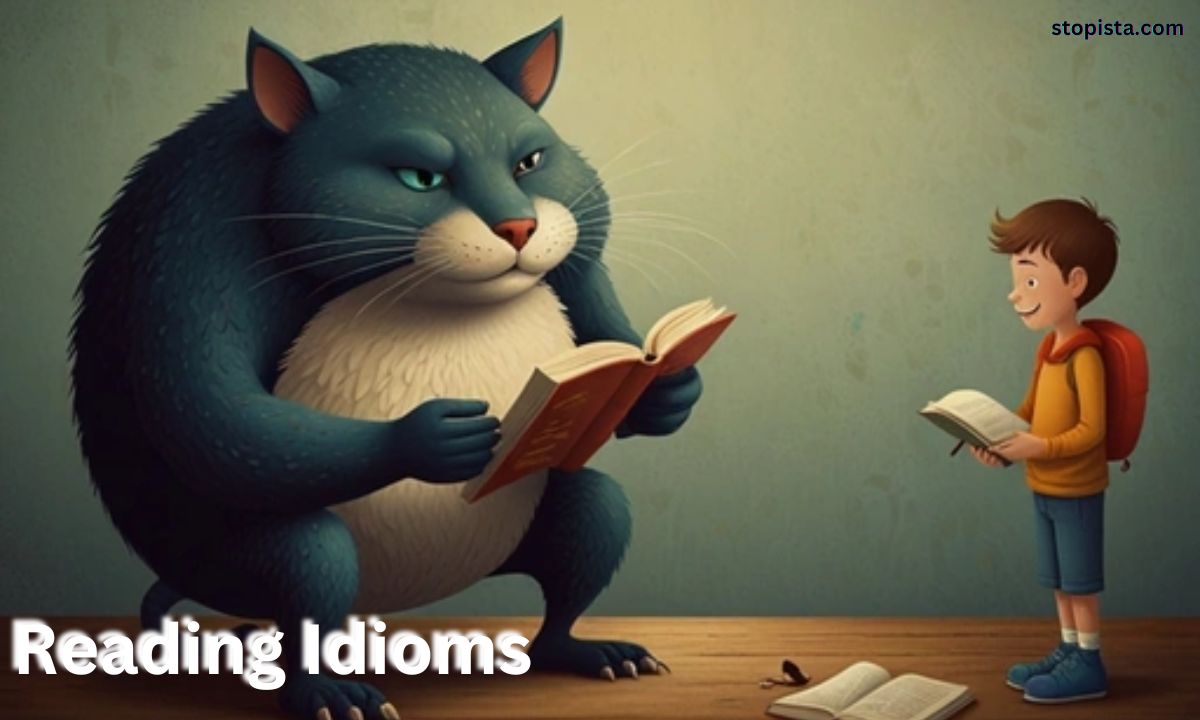Reading is a rich source of expression, and it’s no surprise that our language is filled with idioms related to it. From discovering hidden meanings to diving into stories, reading can be both literal and figurative. Using reading idioms in conversation or writing helps communicate ideas in a more colorful and relatable way. Here’s a collection of 35 reading idioms to help you add some flair to your language!
Reading Idioms: Express Your Thoughts in a New Way
1. Open a Book
- Meaning: To begin a new phase or experience, like starting a new chapter in life.
- In a Sentence: “Starting college was like opening a book to a whole new chapter.”
- Other Ways to Say: Start anew, Begin a new journey, Turn a new page.
2. Read Between the Lines
- Meaning: To understand something that isn’t explicitly stated, or to grasp the hidden meaning.
- In a Sentence: “He didn’t say it directly, but I could read between the lines and tell he was upset.”
- Other Ways to Say: Read the subtext, Infer, Understand the unspoken.
3. By the Book
- Meaning: To do something exactly according to the rules or instructions.
- In a Sentence: “We have to follow the procedure by the book if we want to avoid any issues.”
- Other Ways to Say: According to protocol, By the rules, To the letter.
4. An Open Book
- Meaning: A person whose thoughts or feelings are easy to understand or read.
- In a Sentence: “She’s an open book; you can always tell what she’s thinking.”
- Other Ways to Say: Transparent, Easy to read, Straightforward.
5. A Closed Book
- Meaning: Something or someone that is difficult to understand or figure out.
- In a Sentence: “He’s a closed book, always keeping his thoughts to himself.”
- Other Ways to Say: Enigmatic, Mysterious, Hard to read.
6. Bookworm
- Meaning: A person who loves reading and spends a lot of time doing it.
- In a Sentence: “I was such a bookworm growing up, always reading novels instead of playing outside.”
- Other Ways to Say: Avid reader, Literature lover, Bibliophile.
7. Turn the Page
- Meaning: To move on from one chapter of life and begin a new one.
- In a Sentence: “It’s time to turn the page and start fresh after that tough breakup.”
- Other Ways to Say: Start anew, Move on, Begin again.
8. In the Same Boat
- Meaning: To be in the same situation or facing the same problem as someone else.
- In a Sentence: “We’re all in the same boat, trying to finish this project on time.”
- Other Ways to Say: On the same page, In the same situation, Sharing the same fate.
9. Read Someone Like a Book
- Meaning: To easily understand someone’s thoughts or emotions.
- In a Sentence: “I can read him like a book; I knew something was wrong the moment I saw his face.”
- Other Ways to Say: Understand completely, Know inside and out, See through.
Also Raed: 45 Idioms About Lying
10. A Picture is Worth a Thousand Words
- Meaning: A visual representation can convey complex ideas more effectively than words.
- In a Sentence: “Instead of explaining the process, she showed us the diagram because a picture is worth a thousand words.”
- Other Ways to Say: A visual speaks louder, Seeing is believing, Actions speak louder than words.
11. Don’t Judge a Book by Its Cover
- Meaning: Don’t form an opinion based on outward appearances.
- In a Sentence: “At first glance, the old man seemed grumpy, but don’t judge a book by its cover.”
- Other Ways to Say: Look deeper, Appearances can be deceiving, Don’t judge hastily.
12. The Story of My Life
- Meaning: Used to express that something is a typical, recurring situation for you, often in a negative light.
- In a Sentence: “I missed the bus again this morning—the story of my life.”
- Other Ways to Say: Just my luck, Typical of me, Same old story.
13. A Page Turner
- Meaning: A book or story that is very interesting and keeps you hooked.
- In a Sentence: “That novel was such a page-turner; I couldn’t put it down.”
- Other Ways to Say: Gripping read, Engrossing, Captivating.
14. The Plot Thickens
- Meaning: A situation becomes more complicated or intriguing.
- In a Sentence: “First he said he was innocent, but now the plot thickens with new evidence.”
- Other Ways to Say: Things get interesting, The mystery deepens, It’s getting complicated.
15. Hit the Books
- Meaning: To study or prepare for something.
- In a Sentence: “I have to hit the books tonight to prepare for tomorrow’s exam.”
- Other Ways to Say: Study hard, Buckle down, Get to work.
16. Close the Book
- Meaning: To end something or bring it to a conclusion.
- In a Sentence: “After years of debating, we decided to close the book on that issue.”
- Other Ways to Say: End, Finish up, Wrap up.
17. A Chapter in My Life
- Meaning: A specific period or event in someone’s life.
- In a Sentence: “Moving to another city was a big chapter in my life.”
- Other Ways to Say: A phase, A stage, A turning point.
18. Bookmark
- Meaning: To save or highlight something for later, often in the context of a task.
- In a Sentence: “I’ll bookmark this article for later when I have more time.”
- Other Ways to Say: Save for later, Set aside, Mark for later.
19. Read the Room
- Meaning: To understand the mood or atmosphere of a situation or group of people.
- In a Sentence: “He didn’t even read the room before cracking that joke—now it’s awkward.”
- Other Ways to Say: Gauge the situation, Sense the mood, Pick up the vibe.
20. A Tale of Two Cities
- Meaning: A situation where two contrasting elements are at play, often with a sense of dramatic conflict.
- In a Sentence: “The company’s performance is a tale of two cities—its growth is impressive in some areas but disappointing in others.”
- Other Ways to Say: A story of contrasts, A contrast of extremes, A divided story.
21. Read the Fine Print
- Meaning: To examine the details carefully, often to understand the hidden or small information.
- In a Sentence: “You have to read the fine print before signing any contract.”
- Other Ways to Say: Examine the details, Check the terms, Look at the small print.
22. A Bedtime Story
- Meaning: A simple or overly exaggerated story, often told to entertain or to lull someone to sleep.
- In a Sentence: “The politician’s promises were nothing but a bedtime story to keep the public happy.”
- Other Ways to Say: Fairytale, Tall tale, Fanciful narrative.
23. The Write Stuff
- Meaning: The necessary skill or talent to succeed in a particular field.
- In a Sentence: “She’s got the write stuff to make it as a novelist.”
- Other Ways to Say: The right skills, The necessary talent, The right qualifications.
24. Turn the Page
- Meaning: To leave behind a past experience and move forward.
- In a Sentence: “It’s hard, but it’s time to turn the page and embrace the future.”
- Other Ways to Say: Move on, Begin anew, Start fresh.
25. Not the Write Type
- Meaning: Lacking the qualities required for a particular task or job.
- In a Sentence: “He’s just not the write type for this project; we need someone with more experience.”
- Other Ways to Say: Not suitable, Not cut out for, Not fit for.
26. Throw the Book at Someone
- Meaning: To punish or criticize someone severely.
- In a Sentence: “The judge threw the book at him for his reckless behavior.”
- Other Ways to Say: Lay down the law, Give a harsh penalty, Come down hard.
27. Book Smart
- Meaning: Knowledge gained through reading or formal education.
- In a Sentence: “He’s book smart but lacks the practical experience to apply his knowledge.”
- Other Ways to Say: Academically intelligent, Scholarly, Bookish.
28. Storyteller
- Meaning: A person who excels at narrating stories, either true or fictional.
- In a Sentence: “Her grandmother was an amazing storyteller, always weaving the most magical tales.”
- Other Ways to Say: Narrator, Spinner of tales, Tale weaver.
29. On the Same Page
- Meaning: To be in agreement or have the same understanding about something.
- In a Sentence: “Before we start the project, let’s make sure we’re all on the same page.”
- Other Ways to Say: In agreement, On track, Aligned.
30. The Book Is Closed
- Meaning: A situation is finished, and no further action can be taken.
- In a Sentence: “After the trial, the book was closed on the case, and no one could reopen it.”
- Other Ways to Say: It’s over, The matter is settled, It’s concluded.
31. A Story with a Happy Ending
- Meaning: A situation or narrative that concludes positively, with everything turning out well.
- In a Sentence: “The movie was a tearjerker, but it had a happy ending, and everything worked out for the characters.”
- Other Ways to Say: A feel-good ending, A happy conclusion, A perfect ending.
32. Chapter One
- Meaning: The beginning or first stage of something, often implying a fresh start or the beginning of a new journey.
- In a Sentence: “Graduating college feels like chapter one of my adult life.”
- Other Ways to Say: The start of a new journey, The beginning, The first step.
33. In the Spotlight
- Meaning: To be the center of attention, often in a public setting.
- In a Sentence: “The young actress was in the spotlight after her debut performance.”
- Other Ways to Say: In the limelight, The center of attention, In the public eye.
34. The Writing’s on the Wall
- Meaning: A situation or problem is clearly evident and will likely lead to an inevitable outcome.
- In a Sentence: “When sales started to drop, the writing was on the wall that the company was in trouble.”
- Other Ways to Say: The signs are clear, It’s inevitable, It’s obvious.
35. A New Chapter
- Meaning: Starting a new phase or transition in life.
- In a Sentence: “Moving to a new city was like opening a new chapter for her.”
- Other Ways to Say: A fresh start, A new beginning, A new phase.
MCQ Quiz On Reading Idioms: Express Your Thoughts in a New Way
1. What does the idiom “Read Between the Lines” mean?
a) To read something literally
b) To understand something hidden or implied
c) To skip over details
d) To misinterpret information
Answer: b) To understand something hidden or implied
2. What does “By the Book” refer to?
a) Following instructions precisely
b) Reading a novel
c) Skipping through rules
d) Doing things casually
Answer: a) Following instructions precisely
3. Which idiom means a person who loves to read?
a) Bookworm
b) An Open Book
c) A Page Turner
d) Read the Room
Answer: a) Bookworm
4. If someone is described as “An Open Book,” what does it mean?
a) They are difficult to understand
b) They are always reading
c) Their thoughts and feelings are easy to understand
d) They are hard to predict
Answer: c) Their thoughts and feelings are easy to understand
5. What is the meaning of “Don’t Judge a Book by Its Cover”?
a) Judge a situation by its appearance
b) Form opinions based on someone’s outer looks
c) Don’t judge something based on outward appearances
d) Only judge a book by its title
Answer: c) Don’t judge something based on outward appearances
6. What does the idiom “A Picture is Worth a Thousand Words” mean?
a) Pictures should always be used in books
b) Visuals can convey more than words sometimes
c) Words are more effective than pictures
d) You should never use pictures in writing
Answer: b) Visuals can convey more than words sometimes
7. Which idiom refers to a situation becoming more complicated or intriguing?
a) Read Between the Lines
b) The Plot Thickens
c) A Tale of Two Cities
d) A Bedtime Story
Answer: b) The Plot Thickens
8. What does “Hit the Books” mean?
a) To throw books at someone
b) To study
c) To open a book
d) To write in a book
Answer: b) To study
9. If someone is “On the Same Page,” what does it mean?
a) They are literally reading the same book
b) They agree with each other or understand the same thing
c) They are working on different things
d) They are not communicating effectively
Answer: b) They agree with each other or understand the same thing
10. What does the idiom “The Writing’s on the Wall” mean?
a) Something written in a book
b) A sign that something bad is going to happen
c) The writing is not clear
d) To write an essay
Answer: b) A sign that something bad is going to happen
11. What is the meaning of “A Story with a Happy Ending”?
a) A tragic tale
b) A story that concludes positively
c) A story with no conclusion
d) A fictional narrative
Answer: b) A story that concludes positively
12. What does the idiom “In the Spotlight” mean?
a) To be out of focus
b) To be the center of attention
c) To avoid attention
d) To be in the shadows
Answer: b) To be the center of attention
13. What does “Turn the Page” refer to?
a) To begin a new chapter or stage in life
b) To start reading a new book
c) To mark an important passage in a book
d) To skip ahead in a book
Answer: a) To begin a new chapter or stage in life
14. What does “Read the Room” mean?
a) To read a book in a room
b) To understand the mood or atmosphere of a situation
c) To leave a room quietly
d) To ignore people in a room
Answer: b) To understand the mood or atmosphere of a situation
15. Which idiom refers to someone who is difficult to understand?
a) A Closed Book
b) An Open Book
c) Bookworm
d) A Page Turner
Answer: a) A Closed Book
16. What does “The Book is Closed” mean?
a) The story is still open for discussion
b) The matter or situation is finished
c) The book is physically closed
d) The book is unreadable
Answer: b) The matter or situation is finished
17. What does the idiom “A New Chapter” refer to?
a) A new novel
b) A new phase or transition in life
c) A new book by an author
d) A chapter in an old book
Answer: b) A new phase or transition in life
18. What does “Book Smart” mean?
a) Someone who reads a lot of books
b) Someone who is knowledgeable but lacks practical experience
c) Someone who never reads
d) Someone who writes books
Answer: b) Someone who is knowledgeable but lacks practical experience
19. What is meant by “The Tale of Two Cities”?
a) A story about two different locations
b) A comparison of two contrasting elements or situations
c) A single location in a book
d) A city with a strange history
Answer: b) A comparison of two contrasting elements or situations
20. What does “A Bedtime Story” mean?
a) A story to be read at night before bed
b) A very exciting and dramatic story
c) A story that is overly exaggerated or simple
d) A real-life story
Answer: c) A story that is overly exaggerated or simple
Final Word
Idioms related to reading add fun and clarity. They make communication more lively and engaging. Idioms like “read between the lines” or “bookworm” are common. Each idiom carries a unique meaning that enriches conversation.
These expressions help us understand everyday situations better. Whether it’s “in the spotlight” or “by the book,” they provide insight. Reading idioms are perfect for spicing up language. They bring color and life to the way we speak.









